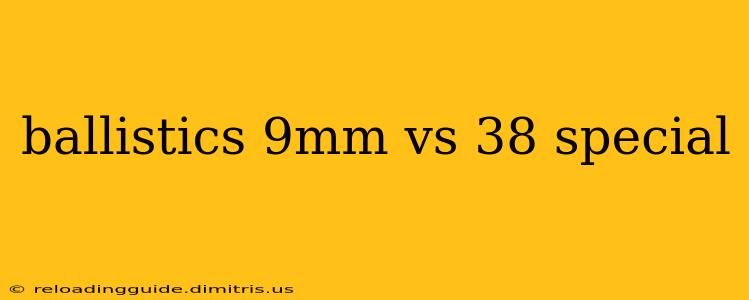Choosing between a 9mm and a .38 Special cartridge often comes down to personal preference, but understanding the ballistics of each caliber is crucial for informed decision-making. This in-depth comparison explores the key differences in performance, applications, and suitability for various purposes.
Key Ballistic Differences: 9mm vs .38 Special
Both the 9mm Parabellum (9x19mm) and the .38 Special are popular handgun cartridges, but their ballistic profiles differ significantly. Let's examine the key distinctions:
Caliber and Bullet Diameter:
- 9mm: Has a slightly larger bullet diameter (9mm or approximately .355 inches) compared to the .38 Special.
- .38 Special: Features a bullet diameter of .357 inches. This seemingly small difference impacts trajectory and penetration.
Muzzle Velocity and Energy:
- 9mm: Generally boasts higher muzzle velocity and energy, leading to flatter trajectory and greater range. Modern 9mm ammunition frequently exceeds 1100 fps (feet per second) with significant energy transfer.
- .38 Special: Typically exhibits lower muzzle velocity and energy than the 9mm, resulting in a more pronounced bullet drop over distance.
Recoil:
- 9mm: The higher velocity often translates to slightly more felt recoil than the .38 Special, especially in lighter firearms. However, this difference is usually manageable for most shooters.
- .38 Special: Generally offers less recoil, making it a potentially more comfortable choice for novice shooters or those with smaller builds.
Penetration and Expansion:
- 9mm: Modern 9mm ammunition, particularly jacketed hollow-point rounds, demonstrates excellent expansion and controlled penetration, making it effective for self-defense.
- .38 Special: The performance of .38 Special ammunition varies significantly depending on the bullet type. While some loads offer adequate expansion, others may over-penetrate or fail to expand reliably.
Practical Applications: Where Each Caliber Excels
The choice between 9mm and .38 Special often depends on the intended application:
9mm:
- Self-defense: The higher velocity and energy, combined with the availability of effective self-defense ammunition (jacketed hollow points), make the 9mm a popular choice for personal protection.
- Law enforcement: Widely used by law enforcement agencies worldwide for its balance of stopping power and manageable recoil.
- Sport shooting: The 9mm's popularity in competitive shooting (like IPSC) is driven by its accuracy and affordability.
.38 Special:
- Concealed carry: The lower recoil can be advantageous for smaller individuals or those carrying concealed weapons.
- Target practice: Its affordability and manageable recoil make it a popular option for casual target shooting.
- Revolver enthusiasts: The .38 Special is a classic revolver cartridge, valued for its reliability and simplicity.
Conclusion: The Right Choice for You
Ultimately, the "better" cartridge depends on individual needs and priorities. The 9mm generally offers superior ballistics in terms of velocity and energy, making it a versatile choice for self-defense and various shooting applications. However, the .38 Special's lower recoil and affordability might be preferable for certain users and applications. Careful consideration of the ballistic differences and intended use is crucial for making an informed decision. Consult with experienced shooters and professionals to make the best choice for your specific circumstances.

